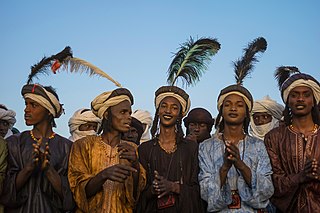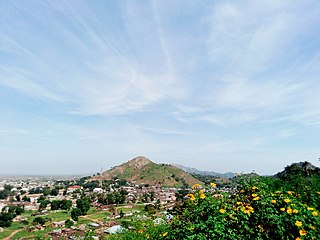
The Fula, Fulani, or Fulɓe people are an ethnic group in Sahara, Sahel and West Africa, widely dispersed across the region. Inhabiting many countries, they live mainly in West Africa and northern parts of Central Africa, South Sudan, Darfur, and regions near the Red Sea coast in Sudan. The approximate number of Fula people is unknown, due to clashing definitions regarding Fula ethnicity. Various estimates put the figure between 25 and 40 million people worldwide.

Plateau is a north central Nigerian state. It is located near the centre of Nigeria and includes a range of hills surrounding the Jos Plateau. Plateau State is described as "The Home of Peace and Tourism". The state has a population of around 4.7 million people. Its capital city is Jos.

Nasarawa is a state in the North Central region of Nigeria, bordered to the east by the states of Taraba and Plateau, to the north by Kaduna State, to the south by the states of Benue and Kogi, and to the west by the Federal Capital Territory. Named for the historic Nasarawa Emirate, the state was formed from the west of Plateau State on 1 October 1996. The state has thirteen local government areas and its capital is Lafia, located in the east of the state, while a key economic centre of the state is the Karu Urban Area—suburbs of Abuja—along the western border with the FCT.

Jukun are an ethno-linguistic group or ethnic nation in West Africa. The Jukun are traditionally located in Taraba, Benue, Nasarawa, Plateau, Adamawa, Bauchi and Gombe States in Nigeria and parts of northwestern Cameroon. They are descendants of the people of Kwararafa. Most of the tribes in the north central of Nigeria trace their origin to the Jukun people and are related in one way or the other to the Jukuns. Until the coming of both Christianity and Islam, the Jukun people were followers of their own traditional religions. Most of the tribes, Alago, Agatu, Rendere, Goemai in Shendam, and others left Kwararafa when it disintegrated as a result of a power tussle. The Jukuns are divided into two major groups; the Jukun Wanu and Jukun Wapa. The Jukun Wanu are fishermen residing along the banks of the river Benue and Niger where they run through Taraba State, Benue State and Nasarawa State. The Wukari Federation, headed by the Aku Uka of Wukari, is now the main centre of the Jukun people.

Religious violence in Nigeria refers to Christian-Muslim strife in modern Nigeria, which can be traced back to 1953. Today, religious violence in Nigeria is dominated by the Boko Haram insurgency, which aims to establish an Islamic state in Nigeria. Since the turn of the 21st century, 62,000 Nigerian Christians have been killed by the terrorist group Boko Haram, Fulani herdsmen and other groups. The killings have been referred to as a silent genocide.

Fulani herdsmen or Fulani pastoralists are nomadic or semi-nomadic Fulani people whose primary occupation is raising livestock. The Fulani herdsmen are largely located in the Sahel and semi-arid parts of West Africa, but due to relatively recent changes in climate patterns, many herdsmen have moved further south into the savannah and tropical forest belt of West Africa. The herdsmen are found in countries such as Nigeria, Niger, Senegal, Guinea, Mauritania, Mali, Burkina Faso, Ghana, Benin, Côte d'Ivoire, and Cameroon. In Senegal, they inhabit northeastern Ferlo and the southeastern part of the country. In some of these countries the Fula constitute a minority group. They inhabit Northern Nigeria and some parts of the country.

Communal conflicts in Nigeria can be divided into two broad categories:
Nimbo is a border town in Uzo-Uwani area of Enugu State, Nigeria, where seven villages- Ekwuru, Nimbo-Ngwoko, Ugwuijoro, Ebor, Enugu-Nimbo, Umuome and Ugwuachara were invaded, and scores massacred by over 500 armed Fulani herdsmen, rated the fourth deadliest terror group in the world, in the early hours of April 25, 2016. Uzo Uwani has boundaries with the Southern States of Ebonyi and Anambra, and Central States of Benue and Kogi, where these attacks have increased lately.
Across Nigeria, there are a series of disputes over arable land between predominantly Muslim Fulani herders and predominantly Christian non-Fulani farmers. The conflicts have been especially prominent in the Middle Belt since the return of democracy in 1999. More recently, they have deteriorated into attacks on farmers by Fulani herdsmen.
Ethnic conflicts involving the Fulani people occur in West Africa, primarily in Nigeria, but also in Mali, Cameroon, the Democratic Republic of Congo, and the Central African Republic, due to conflicts over land and culture. The death count for each attack is small, although the cumulative death count is in the thousands.

On March 23, 2019, several attacks by gunmen killed a reported 160 Fulani herders in central Mali. The violence came in the aftermath of the Malian government cracking down on Islamic terror cells in the country. Two villages, Ogossagou and Welingara, were particularly affected.

The Fulani refers to an ethnic group, the Fulani, whose neighboring farmers are against them in various ethnicities. Nigeria is considered a “melting pot” of different cultural and ethnic groups. Ethnic identification in the country is a complicated amalgamation of primordial and constructivist approaches.

Nomadic conflict, also called farmer–herder conflict, is a type of environmental conflict where farming and herding communities overlap and has been used to refer to fighting among herding communities or fighting between herding and farming communities. This is sometimes referred to as conflict involving “pastoralists” or “nomadic” people and “agriculturalists” or “settled” people. The conflicts usually arise from destruction of crops by livestock and is exacerbated during times when water and lands to graze are scarce.
Anti-Fulani sentiment is the hostility that exists towards Fulani people in Nigeria, Mali and other West African nations and the discrimination that they are subjected to as a result of it. The Fulani are a semi-nomadic ethnic group that is dispersed across several West African countries. Fulani people represent 6% of Nigeria's population.
On April 12, 2022, armed herdsmen attacked several villages in Benue State, Nigeria, killing over 25 people and injuring many more.
Between December 19 and 25, 2022, several villages in Kagoro, Kaduna State, Nigeria were attacked by unknown groups, who killed over 46 people in two attacks.

The majority of herders in African countries are livestock owners. Livestock farming is a part of Nigeria's agriculture system. In 2017, Nigeria had approximately over 80 million poultry farming, 76 million goats, 43.4 million sheep, 18.4 million cattle, 7.5 million pigs, and 1.4 million of its equivalent. Livestock farming is about 5% of Nigeria's gross domestic product and 17% of its agricultural gross domestic product.

A series of armed attacks occurred between 23 and 25 December 2023 in Plateau State in central Nigeria. They affected at least 17 rural communities in the Nigerian local government areas of Bokkos and Barkin Ladi, resulting in at least 200 deaths and injuries to more than 500 people as well as significant property damage. Although no group claimed responsibility for the attacks, they are believed to have been committed by Fulani militias.
On June 7, 2021, suspected Fulani herdsmen attacked the village of Odugbeho, Agatu LGA, Benue State, Nigeria, killing at least forty people.











